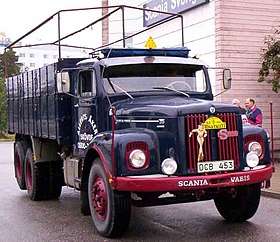Scania-Vabis L75
The Scania-Vabis L75/L76 was a series of heavy duty trucks produced by Swedish automaker Scania-Vabis between 1958 and 1968.
| Scania-Vabis L75/L76 | |
|---|---|
 | |
| Overview | |
| Manufacturer | Scania-Vabis |
| Production | 1958 - 1968, 43,334 produced[1] |
| Body and chassis | |
| Class | Heavy duty truck |
| Powertrain | |
| Engine | Scania-Vabis ohv I6 diesel engine |
| Transmission | 5/10 speed manual |
| Dimensions | |
| Wheelbase | 3.4 m (133.9 in) - 5.4 m (212.6 in)[1] |
| Curb weight | 13,000 kg (28,660.1 lb) - 22,500 kg (49,604.0 lb) (gross weight)[1] |
| Chronology | |
| Predecessor | Scania-Vabis Regent |
| Successor | Scania L110 |
Scania-Vabis L75
In the spring of 1958, Scania-Vabis introduced a new generation of trucks, with newly designed six-cylinder engines,[2] stronger chassis components and a new, more spacious and comfortable cab. The cab would be used for all conventional trucks until 1980.[2] The largest model, called L75, had a ten litre engine. The truck was also offered with a trailing axle. This version was called the LS75, with an “S” for "support axle". For real heavy duty work Scania-Vabis offered a version with tandem drive rear axles. It was called LT75, with “T” for "tandem". The L75 series trucks came with air brakes, but power steering was still an option. From 1961 the truck was offered with a turbo-diesel.[2]
Scania-Vabis L76
In early 1963 the improved L76/LS76/LT76 series was introduced, with an eleven litre engine and dual circuit brakes.
Since the 345 model had disappeared in 1939 Scania-Vabis had only built conventional trucks, since it was the most popular design in the Scandinavian market. By the early 1960s, many European countries introduced regulations limiting the maximum length for truck and trailer. This resulted in increased demand for forward control trucks. With the introduction of the L76 series there was also a forward control version, LB76 (LBS76 with trailing axle). The “B” stood for "Bulldog" which was Scania-Vabis’ name for forward control vehicles. The LB cab was fixed, which made access to the engine for service difficult.[2]
Engines
| Model | Year | Engine[1] | Displacement | Power | Type |
|---|---|---|---|---|---|
| L75 | 1958-63 | Scania-Vabis D10: I6 ohv | 10,261 cc (626.2 cu in) | 165 bhp (123 kW) | Diesel engine |
| L75 Super | 1961-63 | Scania-Vabis DS10: I6 ohv | 10,261 cc (626.2 cu in) | 205 bhp (153 kW) | Turbodiesel |
| L76 | 1963-68 | Scania-Vabis D11: I6 ohv | 11,021 cc (672.5 cu in) | 190 bhp (142 kW) | Diesel engine |
| L76 Super | 1963-68 | Scania-Vabis DS11: I6 ohv | 11,021 cc (672.5 cu in) | 260 bhp (194 kW) | Turbodiesel |
Gallery
 1960 Scania-Vabis LS75
1960 Scania-Vabis LS75 1967 Scania-Vabis L76 fire engine
1967 Scania-Vabis L76 fire engine- 1963 Scania-Vabis LBS76
 Scania-Vabis LB76 Truck
Scania-Vabis LB76 Truck
References
- Lindh, Björn-Eric (1992). Scania: fordonshistoria 1891-1991. Stockholm, Sweden: Streiffert & Co. ISBN 91-7886-074-1.
- Scania trucks: A century on the road